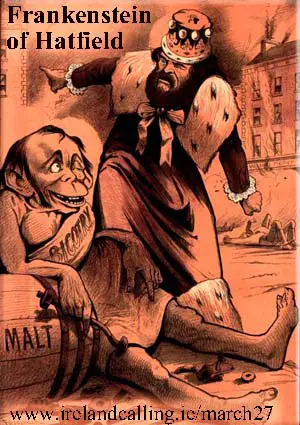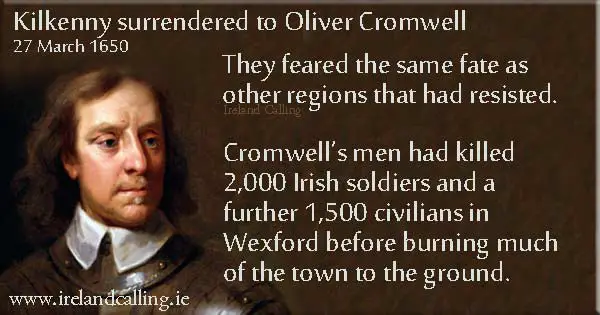march-top.html
1650 Kilkenny surrendered to Oliver Cromwell on this day in 1650. Cromwell and his army were hell-bent on taking control of Ireland and Kilkenny yielded to the superior militant force of Cromwell, rather than suffer the same fate as other territories that chose to fight.
Cromwell’s men had killed 2,000 Irish soldiers and a further 1,500 civilians in Wexford before burning much of the town to the ground. This massacre took place despite ongoing peace deal negotiations between Cromwell and the town’s leaders.
Click here to read more about Cromwell’s invasion of Ireland
1766 The Vicar of Wakefield was published for the first time on this day in 1766. The novel was a huge success and reportedly saved Oliver Goldsmith from being evicted.
According to close friend Dr Samuel Johnson, Goldsmith was unable to pay his rent and under threat of eviction from his landlady until Johnson went and sold the book for him and returned with the money. Here is Johnson’s description of the incident:
“I received one morning a message from poor Goldsmith that he was in great distress. I found that his landlady had arrested him for his rent, at which he was in a violent passion. “I began to talk to him of the means by which he might be extricated. He then told me he had a novel ready for the press, which he produced to me.
“I looked into it and saw its merit and, having gone to a bookseller, sold it for sixty pounds. I brought Goldsmith the money, and he discharged his rent, not without rating his landlady in a high tone for having used him so ill.”
In this scene from The Vicar of Wakefield, They are measuring the heights of Olivia Primrose and Squire Thornhill by standing back-to-back.

Click here to read some Oliver Goldsmith quotes

* * *
1839 John Ballance was born in County Antrim on this day in 1839. He moved to Birmingham and married before emigrating to New Zealand.
There, Ballance had a successful career as a journalist and set up his own newspaper. He wrote criticising the government’s military approach in the Maori Wars.
He became involved in politics and was elected as Prime Minister in 1891. Ballance had the respect of both the native Maoris, and the European settlers. He was also instrumental in giving women the vote in 1893, making New Zealand the first country in the world to do so.

* * *
 1912 Thomas Fitzpatrick died on this day in Dublin. He was a celebrated cartoonist and contributed to several satirical newspapers and magazines in Ireland in the late 19th and early 20th century.
1912 Thomas Fitzpatrick died on this day in Dublin. He was a celebrated cartoonist and contributed to several satirical newspapers and magazines in Ireland in the late 19th and early 20th century.
Fitzpatrick ran his own magazine, called The Leprecaun, to which esteemed writer James Joyce made regular contributions.
Fitzpatrick was also the official cartoonist for Weekly Nation, a newspaper set up with the intent of uniting the people of Ireland.
Weekly Nation was set up by Charles Gavan Duffy, Thomas Osborne Davis and John Blake Dillon, who went on to become part of the revolutionary group, the Young Irelanders.
Lord Salisbury (Prime Minister of the United Kingdom) opposed Home Rule for Ireland (left is a cartoon where Fitzpatrick depicts Salisbury as “The Frankenstein of Hatfield”
* * *
1955 Happy birthday to Patrick McCabe, born on this day in County Monaghan in 1955. He is a successful writer and novelist. His 1992 novel, The Butcher Boy was made into a film starring Eamonn Owens and Stephen Rea.
His 1998 book Breakfast on Pluto was also made into a film, this time with Hollywood stars Cillian Murphy and Liam Neeson playing key roles. Both books received nominations for the Booker Prize.
Click here to read about more great Irish writers
Click here to read more about Cillian Murphy
Click here to read more about Liam Neeson
* * *
1918 Martin Sheridan, a five-time gold medallist, died on 27 March in 1918. He died the day before his 37th birthday.
He moved to America at a young age and represented the USA. In total, Sheridan won five gold medals across the three Games, in the Discus Throw, the Greek Discus and the Shot Put. He also won three silvers and a bronze in the Standing Jump and the Stone Throw. He belonged to a group of Irish-American athletes called the “Irish Whales. These athletes dominated weight-throwing events in the first two decades of the 20th Century.

The New York Times described him as;
‘One of the greatest athletes the United States has ever known”
Martin Sheridan was one of the first victims of the 1918 flu pandemic, which wiped out between 5 and 10% of the world’s population.
Unusually, most victims were healthy young adults, as the virus triggered an explosive response from the body’s immune system. Healthier people produced so many antibodies that their bodies couldn’t cope and were poisoned from the inside, whereas weaker people such as children and the elderly, released fewer antibodies and so survived the virus.

march-bottom.html
